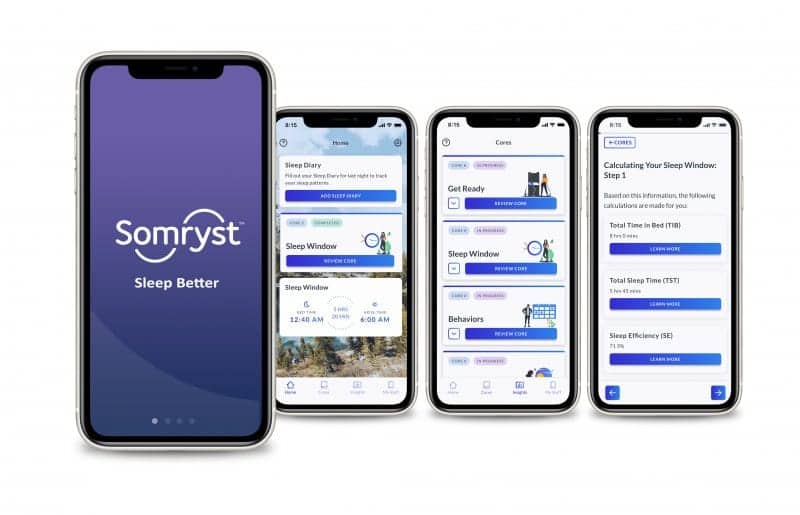Interim follow-up real-world data from the remote decentralized DREAM trial showed that treatment with Pear Therapeutics’ Somryst, the only Food and Drug Administration-authorized prescription digital therapeutic for the treatment of chronic insomnia, achieved significant reductions in symptoms of insomnia, anxiety, and depression severity, both immediately following treatment and six months later. The results were presented as a late-breaking poster (Effects of a Digital CBT-I Therapeutic in Improving Sleep and Reducing Anxiety and Depression Symptoms in Adults With Chronic Insomnia: Interim Analysis of DREAM Study. Poster # 331) at SLEEP 2022.
“Chronic insomnia is often associated with depression and anxiety so it’s important to evaluate the impact of insomnia treatment on such psychiatric comorbidities. We seek to measure not only impact on nighttime sleep but also effect on daytime impairment,” says Yuri Maricich, MD, MBA, chief medical officer and head of development, Pear Therapeutics, in a release. “We’re encouraged by the durable response seen in this interim real-world analysis of cognitive behavioral therapy for insomnia delivered by Somryst and look forward to seeing additional data from the DREAM trial.”
Interim data from the DREAM study (NCT04325464), a remote, virtual, open-label, decentralized clinical trial evaluating Somryst, analyzed in mid-Q1 2022, included 993 adult patients (22-75 years of age) enrolled to date with chronic insomnia living in the United States who had access to a mobile device. Data cutoff for this interim analysis was January 20, 2022.
Results found that patients treated with Somryst for nine weeks with digitally delivered first-line guideline recommended cognitive behavioral therapy for insomnia (CBT-I) was associated with a significant decrease in the symptoms of insomnia severity both immediately following treatment and six months later. Additionally, scores of depression and anxiety decreased significantly both immediately following treatment with Somryst and at 6-month follow-up, with the largest observed decreases in Generalized Anxiety Disorder (GAD-7) and Patient Health Questionnaire depression scale (PHQ-8) scores among people with more severe symptoms.
Specifically, interim data showed participants treated with Somryst experienced the below improvements:
- Insomnia Severity Index (ISI) score: The ISI score at baseline among those with severe insomnia was 23.9, at end of treatment was found to be 14.5, and at 6 months 16.7 (p < 0.0001). ISI is scored on a 0-28 scale.
- PHQ-8: The PHQ-8 score, a 0-24 scaled measure of depression severity, at baseline among those with severe depression was 21.4, at end of treatment was found to be 12.7, and at 6 months 12.3 (Cohen’s d = 0.96-1.51 for moderate to severe depression) (p<0.001), where Cohen’s effect sizes over 1.0 are also considered large treatment effects.1
- GAD-7 scale: The GAD-7 score, a 0-21 scaled measure of anxiety severity, at baseline among those with severe anxiety was 17.6, and at EOT and at 6 months was found to be 10.8 (Cohen’s d = 1.43-1.55 for severe anxiety) (p<0.001).
As part of its PearCreate platform, Pear has developed its own remote, decentralized, virtual clinical trial infrastructure for participant recruitment, screening, consent, enrollment, follow up, and progress tracking, which was used for the DREAM study.
These results are interim and additional results will be reported on in the future, upon completion of enrollment and patients reaching subsequent follow-up assessment periods.



![Virtual Reality Neurofeedback Demonstration Suggests How to Use Technology to Promote Sleep Onset [Video]](https://sleepreviewmag.com/wp-content/uploads/2019/07/virtual-reality-inter-dream-440x264.jpg)